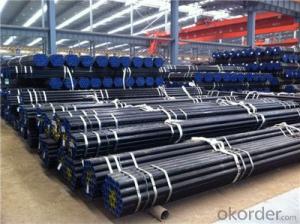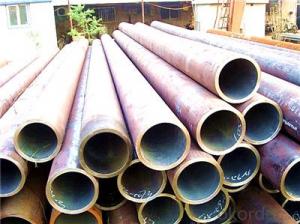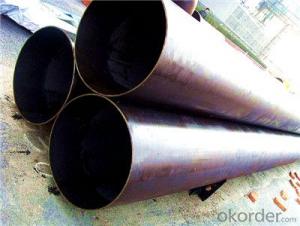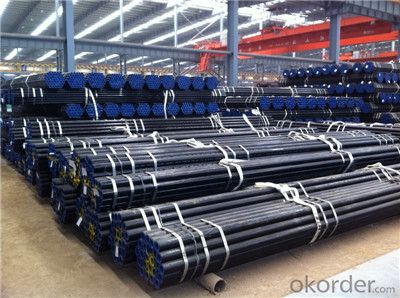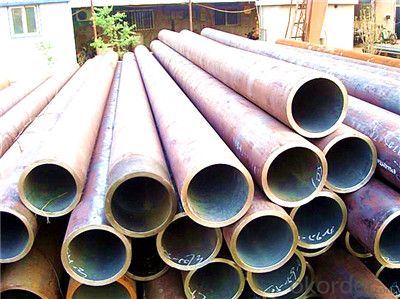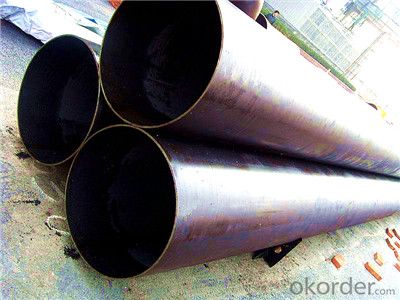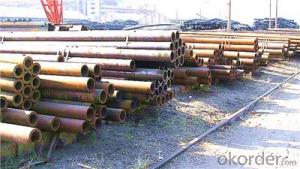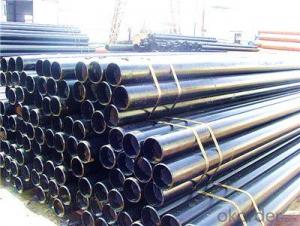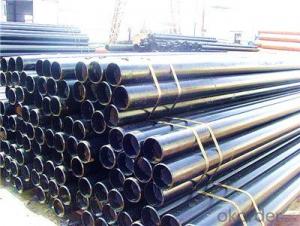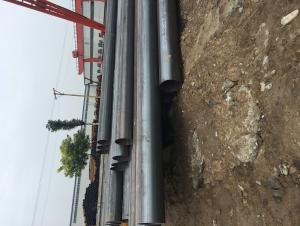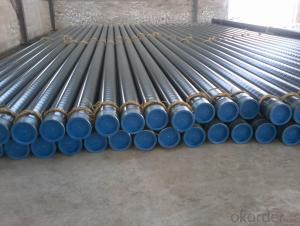Seamless Steel Pipe with Reasonable Price and High Quality
- Loading Port:
- Tianjin
- Payment Terms:
- TT OR LC
- Min Order Qty:
- 100 m.t.
- Supply Capability:
- 2000000 m.t./month
OKorder Service Pledge
OKorder Financial Service
You Might Also Like
PRODUCT DETAILS
1.Structure of Seamless Steel Pipe Description:
A large amount of Seamless Steel Pipes is offered to the clients at cost effective rates. These pipes are extremely durable, resistant to corrosion and have high tensile strength. Our pipes are used in nuclear plants, power plants, refineries and construction industry across the country. Furthermore, we are capable of providing these seamless pipes to the clients in bulk quantity.
2.Main Features of the Steel Pipe:
• High manufacturing accuracy
• High strength
• Small inertia resistance
• Strong heat dissipation ability
• Good visual effect
•Reasonable price
3.Packaging & Delivery:
| Packaging Details: | Seaworthy packages, bundles wrapped with strong steel strip |
| Delivery Detail: | 15-30 days after received 30% TT |
4.Seamless Steel Pipe Specification:
| Standard: | GB, DIN, ASTM,ASME, ASTM A106-2006, ASTM A53-2007 |
| Grade: | 10#,20#, 45#, 16Mn |
Thickness: | 8 - 33 mm |
| Section Shape: | Round |
| Outer Diameter: | 133 - 219 mm |
| Place of Origin: | Shandong, China (Mainland) |
| Secondary Or Not: | Non-secondary |
| Application: | Hydraulic Pipe |
| Technique: | Cold Drawn |
| Certification: | API |
| Surface Treatment: | factory state or painted black |
| Special Pipe: | API Pipe |
| Alloy Or Not: | Non-alloy |
| Length: | 5-12M |
| Outer Diameter: | 21.3-610mm |
5.FAQ of Seamless steel pipe:
①How is the quality of your products?
Our products are manufactured strictly according to national and internaional standard, and we take a test
on every pipe before delivered out. If you want see our quality certifications and all kinds of testing report, please just ask us for it.
Guaranteed: If products’ quality don’t accord to discription as we give or the promise before you place order, we promise 100% refund.
②How about price?
Yes, we are factory and be able to give you lowest price below market one, and we have a policy that “ for saving time and absolutely honest business attitude, we quote as lowest as possible for any customer, and discount can be given according to quantity”,if you like bargain and factory price is not low enough as you think, just don’t waste your time.Please trust the quotation we would give you, it is professional one.
③Why should you chose us?
Chose happens because of quality, then price, We can give you both.Additionally, we can also offer professional products inquiry, products knowledge train(for agents), smooth goods delivery, exellent customer solution proposals.Our service formula: good quality+good price+good service=customer’s trust.
SGS test is available, customer inspection before shipping is welcome, third party inspection is no problem.
Any question, pls feel free to contact us !
- Q: What are the environmental benefits of using steel pipes?
- Steel pipes have several environmental benefits. Firstly, steel is a highly durable material, which means that steel pipes have a longer lifespan compared to other types of pipes. This reduces the need for frequent replacements, ultimately reducing waste generation. Additionally, steel is 100% recyclable, making it a sustainable choice. Using steel pipes promotes a circular economy by reducing the demand for virgin materials and minimizing carbon emissions associated with extraction and manufacturing processes. Furthermore, steel pipes are resistant to corrosion, reducing the risk of leaks and minimizing environmental contamination. Overall, the environmental benefits of using steel pipes include reduced waste, lower carbon emissions, and improved resource efficiency.
- Q: Can steel pipes be used for transporting liquids?
- Yes, steel pipes can be used for transporting liquids. Steel pipes have excellent durability, strength, and corrosion resistance, making them a suitable choice for transporting various liquids, including water, oil, gas, and chemicals.
- Q: How are steel pipes used in the manufacturing of HVAC systems?
- Steel pipes are commonly used in the manufacturing of HVAC systems for various purposes. They are used to transport fluids, such as water or refrigerants, throughout the system. Steel pipes are also used for exhaust systems and ventilation, providing a durable and corrosion-resistant solution. Additionally, steel pipes are used in the construction of HVAC equipment, such as heat exchangers and boilers, due to their strength and ability to withstand high temperatures and pressures. Overall, steel pipes play a crucial role in the efficient and reliable functioning of HVAC systems.
- Q: How are steel pipes used in the manufacturing of chemical processing equipment?
- Due to their durability, corrosion resistance, and ability to withstand high temperatures and pressures, steel pipes find common use in the manufacturing of chemical processing equipment. These pipes serve two primary functions within the equipment: as conduits for transporting raw materials and as channels for distributing processed products. Firstly, steel pipes safely and efficiently transport raw materials, such as chemicals and solvents, from storage tanks or external sources to various processing units within the equipment. This ensures accurate and controlled dosage and distribution. Steel pipes are chosen for this task due to their strength, which enables them to handle the high pressures and temperatures associated with chemical processing. Secondly, steel pipes distribute processed products throughout the equipment. Once raw materials have undergone chemical reactions and transformations, the resulting products must be transported to the next stage or collected for further processing. Steel pipes are ideal for this purpose as they can withstand the corrosive nature of many chemicals and the high temperatures encountered during these processes. In addition, steel pipes offer versatility and compatibility with various chemicals and solvents, making them well-suited for use in chemical processing equipment. They can be easily customized to accommodate specific requirements, such as different pipe sizes, shapes, and fittings. This flexibility allows for efficient design and installation, ensuring a seamless flow of materials and products throughout the equipment. In conclusion, steel pipes play a crucial role in the manufacturing of chemical processing equipment by providing a reliable and efficient means of transporting raw materials and distributing processed products. Their durability, corrosion resistance, and ability to withstand high temperatures and pressures make them an essential component in ensuring the safe and efficient operation of chemical processing equipment.
- Q: Can steel pipes be used for conveying food and beverages?
- To safely transport food and beverages using steel pipes, several precautions must be taken. First and foremost, it is imperative to select stainless steel pipes that are specifically designed for handling food and beverages. These pipes are constructed with high-quality stainless steel, which is resistant to corrosion and does not release harmful substances into the food or beverage. Secondly, it is crucial to thoroughly clean and sanitize the pipes before and after each use to maintain hygiene standards. By regularly cleaning and maintaining the pipes, the accumulation of bacteria or contaminants that could potentially contaminate the food or beverage can be prevented. Furthermore, it is vital to consider the compatibility of the food or beverage with the steel pipes. Certain acidic or corrosive substances may react with the steel, leading to contamination or compromising the integrity of the pipes. In such cases, alternative materials like food-grade plastic or rubber may be more appropriate. In conclusion, while steel pipes can be utilized for conveying food and beverages, it is essential to adhere to guidelines such as using food-grade stainless steel pipes, practicing proper cleaning and sanitization, and considering the compatibility of the specific food or beverage being transported. Following these precautions will uphold the safety and quality of the food or beverage during transportation.
- Q: Is there a weld on the outer wall of seamless steel tube?
- Seamless steel pipe, not seamless steel pipe, seamless steel pipe, welded seam, how can it be called seamless pipe?. Tell you a method: measurement of wall thickness, multi test several points, if each point, that is because it is cold drawn pipe, seamless pipe, hot rolling, wall thickness may% by sample.
- Q: What are the different types of coatings used for external protection of steel pipes?
- There are several types of coatings commonly used for the external protection of steel pipes, including fusion bonded epoxy (FBE) coatings, three-layer polyethylene (3LPE) coatings, three-layer polypropylene (3LPP) coatings, and coal tar enamel (CTE) coatings. Each of these coatings provide different levels of corrosion resistance and durability, depending on the specific requirements of the project or application.
- Q: Are steel pipes recyclable?
- Yes, steel pipes are recyclable. Steel is a highly recyclable material and can be melted down and repurposed into new steel products, including pipes. Recycling steel pipes helps conserve natural resources and reduces the need for new steel production.
- Q: How are steel pipes used in the construction of skyscrapers?
- Steel pipes are commonly used in the construction of skyscrapers for their strength, durability, and versatility. These pipes are typically used as structural elements, forming the framework of the building, providing support and stability. They are used in the construction of columns, beams, and braces, enabling the building to withstand heavy loads and high winds. Additionally, steel pipes are used for plumbing and mechanical systems, carrying water, gas, and other utilities throughout the building. Their use in skyscrapers ensures the overall strength and integrity of the structure.
- Q: Is the steel frame on each floor supporting formwork (floor) called full scaffolding?
- The scaffold is also called full house scaffolding is a construction process for building a scaffold. Hall scaffolding relative to other scaffolding system density, that is, the house full of shelves. The full scaffolding is more secure than the rest of the scaffolding.
Send your message to us
Seamless Steel Pipe with Reasonable Price and High Quality
- Loading Port:
- Tianjin
- Payment Terms:
- TT OR LC
- Min Order Qty:
- 100 m.t.
- Supply Capability:
- 2000000 m.t./month
OKorder Service Pledge
OKorder Financial Service
Similar products
Hot products
Hot Searches
Related keywords
